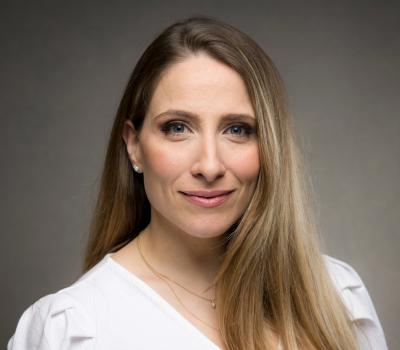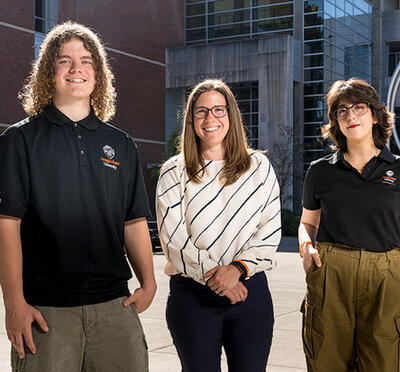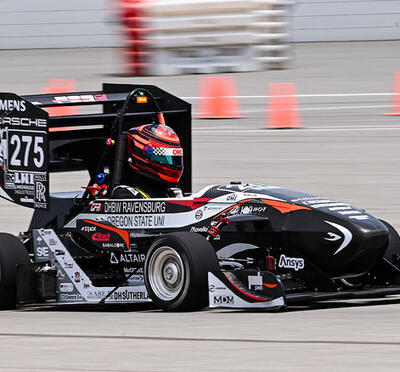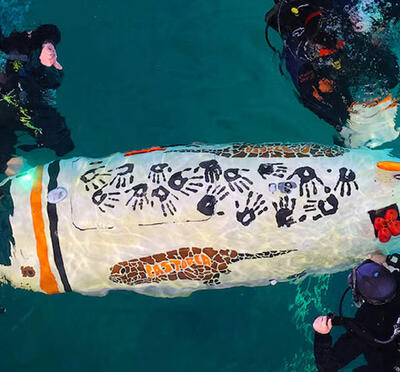For much of her childhood, Bryony DuPont thought she would grow up to be a performer. She acted in her first musical at age 5. By 13, she was taking professional voice lessons and singing in multiple choirs.
However, in high school, she developed another passion.
“I was always good at math, and I was really drawn toward engineering, especially aerospace,” DuPont said.
Engineering won out, at least professionally. DuPont earned her doctorate from Carnegie Mellon in 2013 and joined the faculty of the Oregon State University College of Engineering.
“Pretty quickly after going to college, I decided that I wanted to be a college professor,” she said. “It sounds unorthodox, but being a professor is a great combination of being a practicing engineer and performance.”
Since moving to Corvallis, DuPont has also been active with the nonprofit Majestic Theatre, operated by the city’s Parks and Recreation Department. She has played the wonderfully wicked Ursula in “The Little Mermaid,” and she took the lead as Diana Goodman in the rock musical “Next to Normal.”
But when the COVID-19 pandemic hit, the Majestic, like hundreds of theaters across the nation, was shuttered. It wasn’t clear what would happen to it.
“This is a community theater,” DuPont said. “It lives off of donations and ticket sales.”
Staff at the Majestic came up with the idea to record socially distanced performances and stream them to audiences at home for a fee. DuPont was on board.
“We’re seeing so many artists out of work and all of these theaters closed,” she said. “If there was anything we could do to help the Majestic, we were going to do it.”
The theater manager analyzed the space where members of a cast and crew would be during a performance and determined how many people could be in each of those spaces while maintaining 6 feet of distance.
“We had to have small casts, and we had to have stories that made sense to be told this way,” DuPont said. “Of course, everyone had on face shields, and we were very careful about abiding by the rules.”
DuPont took part in a socially distanced production of “Now. Here. This.” The musical, about a group of friends reuniting at a natural history museum, uses exhibits as backdrops for the characters to tell stories and reflect on their relationships. The script lent itself well to the situation at hand.
“We just changed the opening scene so that everybody shows up in the lobby, and they have the face shields on, and there’s a voiceover describing the need for social distancing and everyone has to wear a mask,” DuPont said.
There were still challenges to overcome when it came to safety protocols.
“Everything was extremely well choreographed,” DuPont said. “When the six of us were on stage, we had specific paths to walk in, and we were constantly maintaining 6 feet of distance between us.” During early rehearsals, the cast sometimes held 6-foot sticks to make sure they were all far enough apart.
There were also challenges for the actors to connect without actually touching. “Theater is very physical, and in the context of tackling difficult themes on stage, that physical connection can be really therapeutic,” DuPont said. “I’m never going to take for granted the idea that you can hug another person.”
The performances went on without any major problems, and feedback was largely positive.
“The fact that we were able to be in this space and film in this space, that was pretty revolutionary,” DuPont said. “And I think people were just grateful to have that escape.”
But in some ways the play still connected with current events. One scene in particular talks about the death of a grandmother.
“Given the pandemic and how all of us are facing mortality in a way that we maybe haven’t had to before, I know was pretty impactful for people,” DuPont said. “We got thanked a bunch for doing that particular scene.”
DuPont is open to doing more remote performances, but she’s looking forward to being back on stage or in a lecture hall in front of people.
“I think we’re doing our best, and it’s helping keep our brains healthy and engaged, but I really don’t think that there’s a substitute for that kind of connection.” she said.




